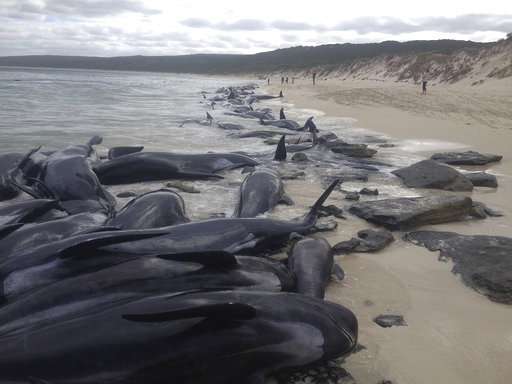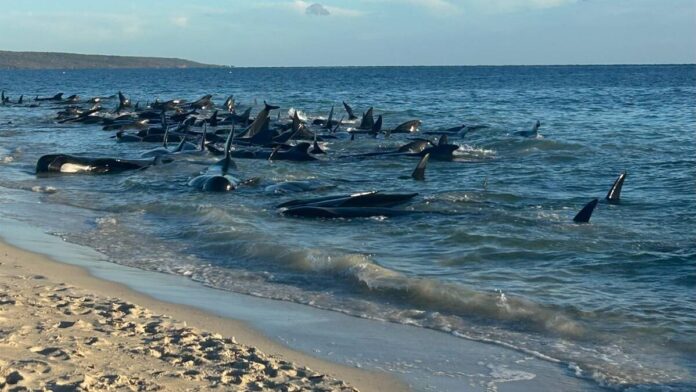The picturesque shores of Western Australia’s south-west have been marred by a tragic event as over 20 pilot whales lost their lives and around 140 more are struggling for survival after a mass stranding at Toby Inlet near Dunsborough. The incident has triggered a massive rescue effort, with community members rallying together to aid the distressed marine mammals.
The Department of Biodiversity, Conservation, and Attractions (DBCA) has been at the forefront of the response, with spokesperson Pia Courtis providing updates on the situation. According to Courtis, the stranded whales are spread across several pods, spanning a distance of approximately 500 meters along the beach. Efforts are underway to prevent another group of whales from coming ashore, highlighting the urgency of the situation.
Tragically, the DBCA has indicated that once beached, euthanasia is often deemed the most humane option for the stranded whales. This decision underscores the challenges faced by wildlife specialists in managing such events, especially with the influx of well-meaning but untrained volunteers. The department has urged the public to refrain from attempting rescue efforts without the guidance of trained personnel to avoid causing further harm to the animals and disrupting the coordinated rescue operation.
The current stranding event is reminiscent of past incidents in the region, including the largest mass stranding of whales in WA’s history back in 1996, also in Dunsborough. On that occasion, 320 long-finned pilot whales were involved, with a majority successfully rescued. However, the toll from this event serves as a sobering reminder of the fragility of these magnificent creatures and the challenges inherent in their conservation.
Geographe Marine Research chair Ian Wiese, present at the scene, described the grim reality of the situation, noting the distressing sight of several whales already deceased while others continue to struggle. Despite efforts to understand the causes of mass whale strandings, including various theories proposed globally, definitive answers remain elusive.
As the rescue efforts continue, emotions run high among volunteers and local residents witnessing the plight of these whales. Chris Hall, a volunteer assisting with the rescue, expressed the distress felt by many, highlighting the emotional toll of the event. Similarly, local whale researcher Chris Burton emphasized the poignant sounds emanating from the stranded whales, a stark reminder of the urgency to act and the importance of preserving these majestic creatures.
The mass stranding at Toby Inlet serves as a somber wake-up call, underscoring the need for continued efforts to protect marine biodiversity and mitigate the threats facing whale populations. While the immediate focus remains on rescuing the stranded whales, the incident also prompts broader reflections on the interconnectedness of human activities and the health of our oceans. As communities come together in solidarity, the hope is that these efforts will not only save individual lives but also contribute to a greater awareness of the challenges confronting our marine ecosystems.



